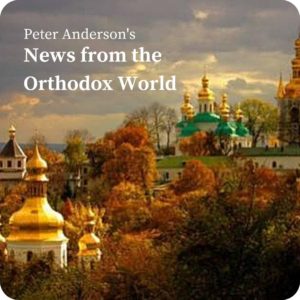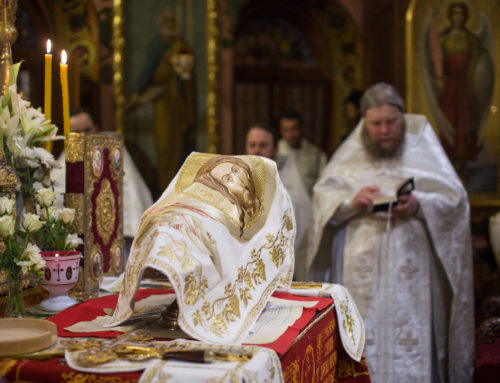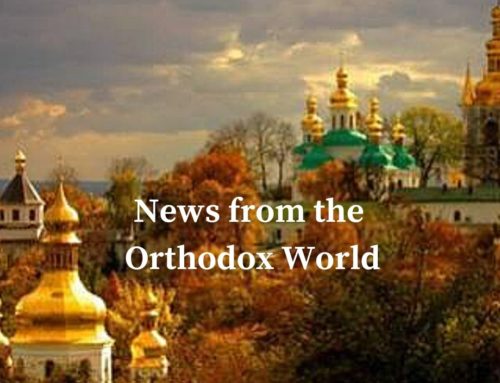Peter Anderson reports from the Orthodox world.
Longstanding reporter of the news from the Eastern Church, Peter Anderson shares our dream of a unified Christianity. His love for Orthodoxy has driven him to this personal mission to share the news of East with the world through his email list. The Urbi et Orbi Foundation is proud to share his efforts and his insights with you.

On May 29, at approximately 11:07 p.m., there was posted on the official website of the Serbian Orthodox Church the “Press Release of the Holy Assembly of Bishops.” At the present time, the press release is only available in Serbian It may be read at https://www.spc.rs/sr/saopshtenje_za_javnost_svetog_arhijerejskog_sabora_5. The release summaries the results of the Assembly held in the crypt of the new and magnificent Church of Saint Sava in Belgrade from May 24 to 29, 2021. The Assembly included all of the bishops who head dioceses of the Serbian Patriarchate throughout the world. The release is very noteworthy both in what was decided and what was not decided.
The most important news is that Bishop Joanikije (Mićović) of Budva-Nikšić, who has been administering the Metropolis of Montenegro and Littoral since the death of Metropolitan Amfilohije, was elected to fill the vacant see. Joanikije is a native of Montenegro and has spent most of his time there. He is 62 years old. A short English-language biography is found at https://newsbeezer.com/serbiaeng/joanikije-is-the-new-metropolitan-of-the-montenegrin-primorye-soc-society/ News of the election was obtained by the media during the daytime hours of May 29, a number of hours prior to the issuance of the press release.
The Serbian news service Novo.rs reports from a source at the Patriarchate that Joanikije was not elected by a vote, but that he was elected by acclamation at the express wish and proposal of Patriarch Porfirije. Novo.rs also states that Bishop David of Kruševac and Bishop Photius of Zvornik-Tuzla did not agree with the Patriarch’s suggestion and requested an actual vote, but the Assembly rejected an actual vote. Previously, there were reports that Bishop Irinej of Bačka was supporting Bishop David of Kruševac for the position. If these reports are true, the election by acclamation avoided a situation where the Patriarch voted for one candidate and Bishop Irinej, whom the Patriarch considers to be his spiritual father, voted for another candidate.
In the evening of May 28, the night before the vote, the Assembly posted a notice including a strong statement that the members of the Assembly “do not make decisions under the influence of political or media campaigns or pressures.” https://www.spc.rs/sr/saopshtenje_informativne_sluzhbe_srpske_pravoslavne_crkve_0 Presumably, this was done by the Assembly in part to emphasize that it would not be influenced by the remarks of the Prime Minister of Montenegro, Zdravko Krivokapić, on May 27 that the people of Montenegro desire the election of Joanikije.
News of the election of Joanikije appears to be very well received in Montenegro. On the evening of May 29, there were fireworks in the capital of Podgorica. https://www.novosti.rs/crna-gora/vesti/1001948/podgorica-slavi-mitropolita-joanikija-veliki-vatromet-iznad-hrama-hristovog-vaskrsenja-video There were enthusiastic congratulations for political leaders such as Krivokapić, Abazović , and Bečić. https://www.novosti.rs/crna-gora/vesti/1001926/mnogaja-ljeta-reakcije-crnogorskih-zvanicnika-izbor-joanikija-mitropolita As you may recall, Bishop Joanikije was very much of a leader in the public demonstrations against the controversial law regulating religion in Montenegro and is very popular with the Serbian Orthodox in Montenegro.
The second item of important news is that the Assembly did not elected a successor to Porfirije for the metropolitan see of Zagreb and Ljubljana. At least for a period of time, it appears that Patriarch Porfirije will continue to administer this see himself. During the years that Porfirije was living in Zagreb, he was very popular there and developed a strong affection for the city. May he wishes to keep that connection for a while longer.
The next important item relates to the composition of the Holy Synod, which consists of the Patriarch and four diocesan bishops. The diocesan bishops are elected for a two-year term. The Assembly appointed to the Holy Synod at the suggestion of Patriarch Porfirije two new members: Bishop Vasilije of Srem and Bishop Photius of Zvornik-Tuzla. The two diocesan bishops whose term continues for another year are Metropolitan Chrysostom of Dabro-Bosnia and Bishop David of Kruševac. The mandates of Bishop Irinej of Bačka and Bishop Jovan of Šumadija on the Holy Synod have now ceased, but they remain as alternate members of the Holy Synod.
The Assembly elected a new bishop for Budva-Nikšić (the position previous held by Joanikije) and a new bishop for Valjevo (whose bishop died from the coronavirus in March) as well as a number of new vicar bishops.
It is interesting that the Assembly’s press release says nothing about Ukraine. However, the Assembly made a statement concerning Ukraine at its May 2019 meeting, and perhaps it believes that it is not necessary to say anything more at this time. The release says nothing about a second Amman-type meeting. The press release also does not say anything about the schismatic Macedonian Orthodox Church or the Ecumenical Patriarch’s offer to mediate. Perhaps all of this reflects the preference of Patriarch Porfirije to work quietly on issues and not to make bold and fiery statements.
Other subjects covered by the press release include: (1) “the condition of our Church and the position of the Serbian people in Kosovo and Metohija;” (2) “the situation and problems of church education and religious instruction in public schools in Serbia;” (3) the elimination of “episcopal councils in various ecclesiastical areas” as they are no longer needed; (4) the celebration of the 100th anniversary of the founding of the Diocese of America-Canada; (5) the emergence of new draft laws affecting churches without dialogue with the churches; (6) the draft law on cultural heritage is unacceptable in that it fails to include important shrines and cultural monuments in the territory of Kosovo and Metohija; (7) the government of Montenegro avoids signing the agreed-upon Basic Agreement. Of course for completeness, the entire press release should be read. One can use the Google translation tool for this.
Peter Anderson, Seattle USA


